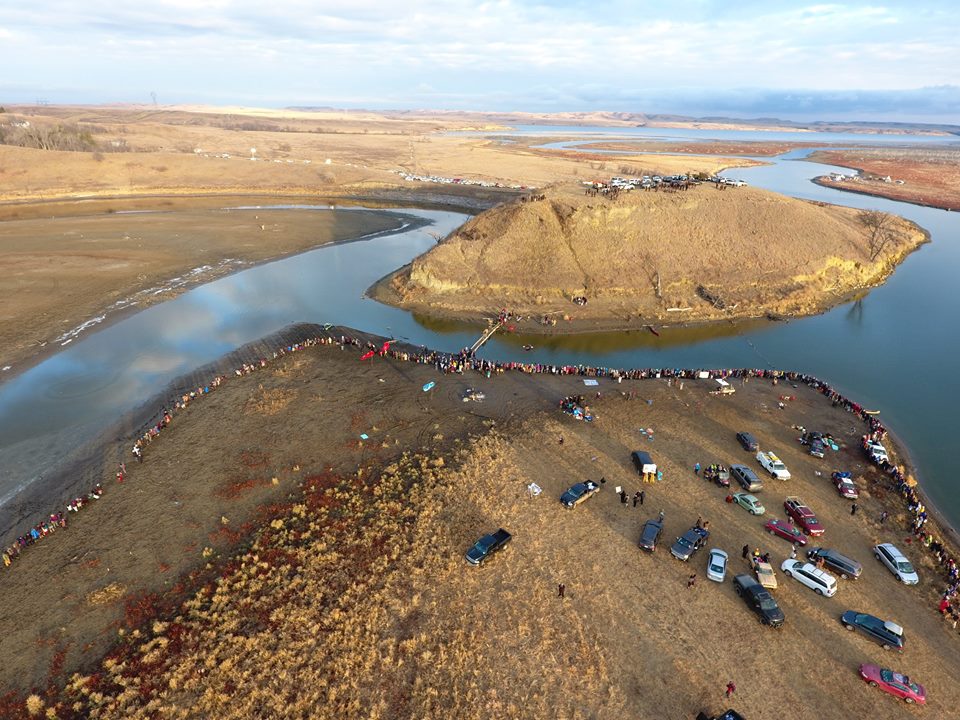
CANNON BALL, N.D. (Diya TV) — The Standing Rock Sioux Tribe won a major victory on Sunday in its battle to block an oil pipeline being built near its reservation when the Army Corps of Engineers announced that it would not allow the North Dakota Access pipeline to be drilled under a dammed section of the Missouri River.
Alternative routes for the $3.7 billion Dakota access pipeline will begin to be scouted, the Army added.
“The best way to complete that work responsibly and expeditiously is to explore alternate routes for the pipeline crossing,” Jo-Ellen Darcy, the Army’s assistant secretary for civil works, said in a statement.The announcement could be a prophesy of a lengthy environmental review that has the potential to block the pipeline’s construction for months or years.
However, the effectiveness of the announcement has already been called into question — President Obama is in the final days of his administration, which first revealed in November the Army Corps of Engineers was considering alternative routes for the pipeline.
President-elect Donald Trump has taken a different view of the pipeline, saying as early as last week that he supported finishing the 1,170-mile pipeline, which spans four states and is nearly complete.
While the Army’s decision calls for an environmental study of alternative routes, Trump’s administration could immediately decide to allow the original, contested decision. The president-elect himself owns stock in the company building the pipeline, Energy Transfer Partners, but has said his support of the completion has nothing to do with his interests in the company.
There was no immediate response from Energy Transfer Partners, but its chief executive, Kelcy Warren, has said that the company was unwilling to reroute the pipeline, which is intended to transport as much as 550,000 barrels of oil a day from the oil fields of western North Dakota to a terminal in Illinois.
Representative Kevin Cramer, Republican of North Dakota and a Trump supporter, called Sunday’s decision a “chilling signal to others who want to build infrastructure in this country.”
“I can’t wait for the adults to be in charge on Jan. 20,” Mr. Cramer said, referring to Mr. Trump’s inauguration.
However, the announcement was the reason for major celebration for members of the Oceti Sakowin camp. Tribal members rode joyously on horseback throughout the camp, pounding drums and gathering for a fire at the center of the camp. Tribal elders celebrated what they said was the validation of months of prayer and protest.
“It’s wonderful,” Dave Archambault II, the Standing Rock tribal chairman, told cheering supporters. “You all did that. Your presence has brought the attention of the world.”
The decision, he said, meant that people no longer had to stay at the camp during North Dakota’s brutal winter.
“It’s time now that we move forward,” Archambault said. “We don’t have to stand and endure this hard winter. We can spend the winter with our families.”
The sheriff has called the demonstrations an unlawful protest, and officials have characterized the demonstrators as rioters who have intimidated ranchers and threatened and attacked law enforcement — charges that protest leaders deny.
Jon Eagle Sr., a member of the Standing Rock Tribe, said the announcement was a vindication for the thousands who had traveled here, and for the multitudes who had rallied to the tribe’s fight on social media or donated.
“I don’t know quite how to put into words how proud I am of our people,” Eagle said. “And I mean our people. I don’t just mean the indigenous people of this continent. I mean all the people who came to stand with us. And it’s a beautiful day. It’s a powerful day.”
Information from the New York Times contributed to this report.




